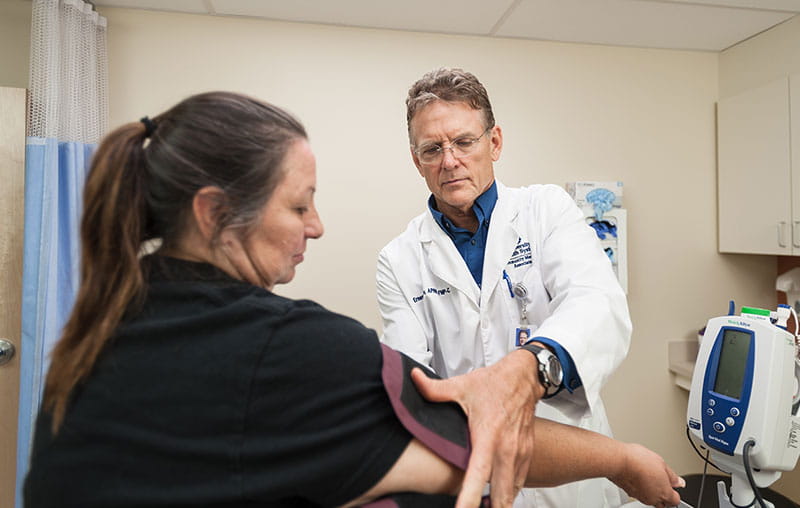Diabetes
What Is Diabetes?
Diabetes is a chronic, long-lasting health condition that affects how your body turns food into energy. Your body breaks down most of the food you eat into sugar (glucose) and releases it into your bloodstream. When your blood sugar goes up, it signals your pancreas to release insulin. Insulin acts like a key to let the blood sugar into your body’s cells for use as energy.
With diabetes, your body doesn’t make enough insulin or can’t use it as well as it should. When there isn’t enough insulin or cells stop responding to insulin, too much blood sugar stays in your bloodstream.
Learn the risk factors for Type 2 diabetes and how you can prevent it.
Types of Diabetes
The three main types of diabetes are Type 1, Type 2 and gestational diabetes. Gestational diabetes only occurs in pregnant people. Learn more about diabetes in our online health library.
Test your risk for diabetes with this online quiz.
Risk Factors for Diabetes
There are multiple factors that increase a person’s risk for Type 2 diabetes, including:
- Being over age 45
- Being overweight
- Family (parent or sibling) history of diabetes
- High blood pressure
- High triglyceride levels
- Inactivity
- Low high-density lipoprotein (HDL) cholesterol (“good” cholesterol)
- Polycystic ovary syndrome
- Poor diet
- Previous gestational diabetes
- Race and ethnicity (Hispanic, African American, Native American)
- Smoking
Effects of Uncontrolled Diabetes on Health
You can manage diabetes with medication and lifestyle changes. Unmanaged diabetes can lead to health complications including:
- Nerve damage
- Blindness
- Kidney failure
- Amputations
Diabetes in Bexar County
Prediabetes and diabetes are on the rise in Texas and Bexar County. Prediabetes is when your blood sugar levels are higher than normal and occurs before a Type 2 diabetes diagnosis. With prediabetes, you can still delay or avoid developing Type 2 diabetes by eating healthier, exercising more and losing weight.
The most recent figures show that more than one-third of San Antonio residents have prediabetes and 12% of Bexar County residents have diabetes. This is higher than the state average of 11.8% and higher than the national average of 8.8%.
In Bexar County, diabetes hospitalization rates for children under 18 increased between 2019 and 2020, with male children experiencing a 36% increase and female children experiencing a 15% increase.
University Health Resources
Texas Diabetes Institute
University Health Texas Diabetes Institute is the nation’s leading diabetes care and research center. Located in the heart of San Antonio’s South Side, Texas Diabetes Institute serves the community members who need it most.
Our diabetes and endocrinology providers offer tailored treatment plans, patient education, classes and more. Endocrinology refers to your body’s hormone-producing glands, like the thyroid and pancreas. Endocrine disorders — like diabetes — indicate your glands or organs are not working properly.
Diabetes Classes
University Health offers classes specifically designed to help people manage their diabetes. Our diabetes educators teach classes about diabetes and pregnancy, exercise and diabetes self-management. Learn more on our website.
Walking Groups
- CareLink Wellness Warriors: Active CareLink members are welcome to join this fitness walk and will receive $15 credit toward their balance to help pay for health care services. Health educators provide information such as tips for staying healthy and recipes members can use at home. Walks are held on Fridays at 9 a.m. in San Pedro Springs Park. This schedule is subject to change. Please call 210-358-3290 or email cloutreach@uhtx.com to learn more.
- Texas Diabetes Institute: The Texas Diabetes Institute Fitness Center leads walking groups for anyone to join, even if they don’t have a diabetes diagnosis. Learn more on our website or call 210-358-7206.
Salud Por Vida
Salud Por Vida is a 12-week program for CareLink members who have diabetes or hypertension. The program focuses on self-management practices and healthy lifestyle behaviors, including healthy eating and physical activity. For more information, please call 210-358-3290 or email cloutreach@uhtx.com.
Community Resources
Viva Health
The San Antonio Metropolitan Health District offers Viva Health, a seven-week workshop designed to help you eat better, live healthier and live longer. Through better nutrition and increased physical activity, you can prevent or delay many chronic diseases. Also, those who have chronic diseases can better manage their symptoms by applying what they learn from these helpful sessions.
Diabetes Prevention & Control
This City of San Antonio program offers free services to the community to prevent and control diabetes. Trained lifestyle coaches and health program specialists participate in community events and workshops bringing diabetes awareness and education. The annual workshop lasts four months. Participants track their weight, eating habits and physical activity levels.
To qualify for this program, you must be at least 18 years old, overweight (Body Mass Index greater than 25) and be at high risk of developing Type 2 diabetes, or already have been diagnosed with prediabetes. Calculate your BMI with this online tool.
Diabetes Garage Workshop for Men
The Diabetes Garage is a four-week virtual workshop specifically designed for men who have been diagnosed with diabetes. It includes curriculum topics including healthy eating, taking medications, checking blood sugar levels and increasing physical activity. The curriculum uses examples of car maintenance and automotive care to describe how men with diabetes should take care of their bodies.
Men who complete the workshop series receive a $20 H-E-B gift card and a toolbox full of items to care of both their car and their body. Each session is once a week for two hours.
Camp Independence of San Antonio
Camp Independence is a summer day camp specially designed for kids with diabetes. Children with diabetes over 5 years of age and siblings over 9 years of age are eligible to attend the camp. Learn more on their website or call 210-601-2090.
Diabetes Self-Management Education and Support (DSMES)
Learn how to take control of your diabetes with diabetes self-management education and support. Find a program near you.





